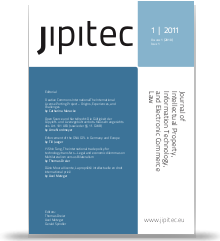Spanish Supreme Court Rules in Favour of Google Search Engine... and a Flexible Reading of Copyright Statutes?
Abstract
On 3 April 2012, the Spanish Supreme Court issued a major ruling in favour of the Google search engine, including its ‘cache copy’ service: Sentencia n.172/2012, of 3 April 2012, Supreme Court, Civil Chamber.* The importance of this ruling lies not so much in the circumstances of the case (the Supreme Court was clearly disgusted by the claimant’s ‘maximalist’ petitum to shut down the whole operation of the search engine), but rather on the court going beyond the text of the Copyright Act into the general principles of the law and case law, and especially on the reading of the three-step test (in Art. 40bis TRLPI) in a positive sense so as to include all these principles. After accepting that none of the limitations listed in the Spanish Copyright statute (TRLPI) exempted the unauthorized use of fragments of the contents of a personal website through the Google search engine and cache copy service, the Supreme Court concluded against infringement, based on the grounds that the three-step test (in Art. 40bis TRLPI) is to be read not only in a negative manner but also in a positive sense so as to take into account that intellectual property – as any other kind of property – is limited in nature and must endure any ius usus inocui (harmless uses by third parties) and must abide to the general principles of the law, such as good faith and prohibition of an abusive exercise of rights (Art. 7 Spanish Civil Code).The ruling is a major success in favour of a flexible interpretation and application of the copyright statutes, especially in the scenarios raised by new technologies and market agents, and in favour of using the three-step test as a key tool to allow for it.Downloads
Published
2012-10-15
Issue
Section
Artikel

